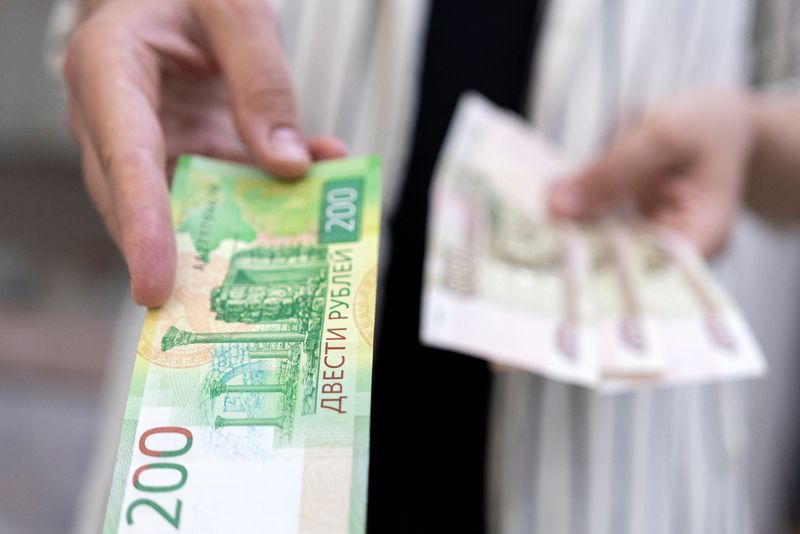By Alexander Marrow
MOSCOW (Reuters) -The rouble clawed back some of this week's hefty losses after sinking to a near eight-month low in a volatile session on Thursday, as the prospect of a favourable month-end tax period mitigated concerns over sanctions on Russian oil and gas.
By 1641 GMT, the rouble was up 2.9% against the dollar at 68.95 after earlier hitting 72.6325, its weakest since April 28, which had taken monthly losses to more than 15%.
It also pared losses to gain 2.7% to trade at 73.55 versus the euro, having earlier slid past the 77 mark for the first time since late April, and recovered to gain 3.1% against the yuan to 9.77, up from a near seven-month low.
Transaction volumes in the currency exceeded 15 billion yuan ($2.15 billion), a record on Moscow Exchange. Russia will start buying yuan on the market next year if oil and gas revenues meet expectations, two sources told Reuters, a report confirmed by Finance Minister Anton Siluanov later on Thursday.
Veles Capital analysts earlier wrote that should the rouble consolidate above the psychologically important levels of 70 per dollar, 75 to the euro and 10 per yuan, it could open up new downside horizons for the Russian currency.
Falling export revenues in recent months have been exacerbated by a European Union oil embargo that began in December, when an oil price cap also took effect.
Brent crude oil, a global benchmark for Russia's main export, was down 0.3% at $82.0 a barrel. [O/R]
Siluanov said the oil price cap had put pressure on the rouble in recent days, but that the recovery in imports was having a greater effect.
"Restrictions were imposed on oil, on gas. They are not functioning today in terms of financial consequences, but they have probably had a moral impact on market participants," the Interfax news agency quoted Siluanov as saying.
TAX SUPPORT
The rouble closed last week at 64.65 to the dollar, but analysts have said they expect the rouble to find a foothold next week when month-end taxes, which usually see Russian exporters convert FX revenues to pay local liabilities, are due.
Russia has borrowed heavily in the final quarter of the year, on Wednesday selling 337.8 billion roubles ($4.96 billion) of OFZ treasury bonds.
Russian banks have bought the vast majority of government debt, with sanctions preventing access for foreign investors, who had traditionally been attracted by Russia's high yields.
Dominant lender Sberbank plans to build its liquidity buffer using bonds with floating-rate coupons, Anatoly Popov, deputy chairman of Sberbank's executive board, told the RIA news agency. The bank holds more than 3 trillion roubles in OFZ bonds.
Russian stock indexes also rebounded.
The dollar-denominated RTS index was up 3.2% at 969.7 points, recovering from its lowest mark since Oct. 10. The rouble-based MOEX Russian index was 0.3% higher at 2,122.9 points.

($1 = 6.9829 Chinese yuan renminbi)
($1 = 68.1000 roubles)